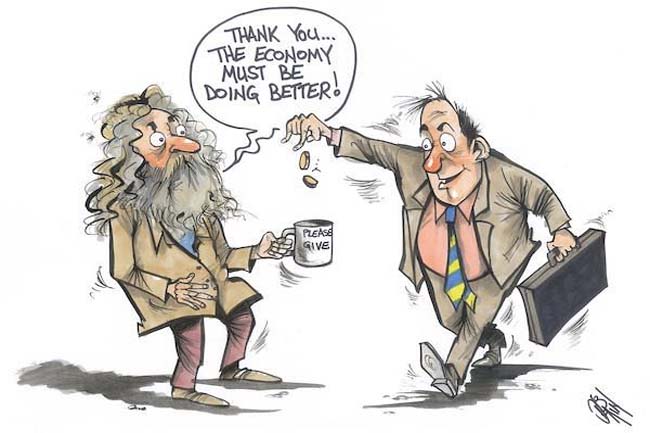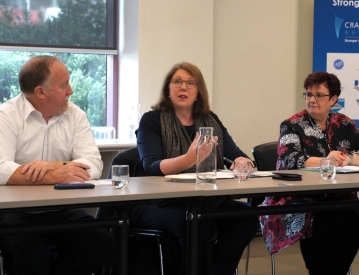The Green New Deal offers a unique chance to stop the worst effects of climate change, writes Dr Steven Hail.
YOU MUST HAVE noticed the emergence of a new political phenomenon in Washington D.C. – Alexandria Ocasio-Cortez. The youngest ever Congresswoman – she has the values, the attitude and the agenda you might expect from a progressive millennial from the Bronx. More than that, she has charisma. For many of us, she is a beacon of hope.
For the Trumpian Republicans, she is their worst nightmare.
Her most important contribution so far is the Green New Deal. Its objective is to, finally, confront the threat of imminent and potentially catastrophic climate change, and the role the U.S. economy and its energy system are playing in driving global carbon emissions and the resulting apparently inexorable increase in the concentration of carbon dioxide and other greenhouse gases in our atmosphere.
You have probably read numerous articles referring to the Green New Deal – some enthusiastic and supportive; some (from the conservative side, and what a misnomer the word "conservative" is when used to refer to destructive climate change deniers) aggressively dismissive; and some (from the establishment democrat side) affirming its ideals, but bemoaning its lack of realism, and offering to devise a more "pragmatic" approach.
What does the Green New Deal actually involve? You can read it for yourself. It is House Resolution 109 in the 116th Congress (2019-20).
This resolution accepts the evidence from climate scientists that climate change is driven by human activity. It accepts that warming of more than two degrees over pre-industrial levels will have a series of catastrophic consequences, which it lists. It accepts the scientific evidence that major emissions reductions are needed within ten years and that net-zero emissions worldwide must be achieved within thirty years if we are to be confident of avoiding this outcome.
It is wise to ignore those who claim we have more time than this, as they are almost always betting our civilisation on the development of highly speculative technologies which may never be available to justify increasing our available carbon budget and delaying the adjustments we need to make.
The Green New Deal advocates for a reduction in the inequality of income and wealth, for a variety of reasons, one of which is that the 1 per cent (and the 10 per cent) are responsible for a disproportionate share of carbon emissions, both in the U.S. and worldwide.
Carbon pricing (or carbon taxes) can play a role in changing behaviour – changing what is consumed and how it is produced – to move us incrementally towards sustainability. Regulations on energy efficiency are also very helpful.
But, as the leading climate change scientist Kevin Anderson has said many times, if we are to meet this existential challenge with a good chance of success, we need a fundamental shift in our economic system. In his words, we need "a shift in the productive capacity of society akin to that in World War Two".
Ocasio-Cortez does not duck or obfuscate this reality.
Her Resolution 109 talks of:
- ‘Repairing and upgrading the infrastructure of the United States’;
- ‘Meeting 100 per cent of the power demand in the United States through clean, renewable, and zero-emission energy sources’;
- ‘Working collaboratively with farmers and ranchers in the United States to remove pollution and greenhouse gas emissions from the agricultural sector as much as is technologically feasible’;
- ‘Overhauling transportation systems in the United States to remove pollution and greenhouse gas emissions from the transportation sector as much as is technologically feasible’;
- ‘Restoring and protecting threatened, endangered, and fragile ecosystems’; and
- ‘Making the United States the international leader on climate action’.
It may be that Donald Trump and Tony Abbott genuinely don’t understand the problem, or it may be that they don’t want to understand.
That there are establishment Democrats in the U.S. and members of the Australian Labor Party here who would dismiss a Green New Deal, because they think it more realistic to gamble the future on a technology fairy than to seize the challenge laid down by Ocasio-Cortez and others, is more difficult to explain.
If the world as a whole needs to cut its emissions to zero by the 2050s, which is what a prudent interpretation of the science indicates, then the rich countries which have created the lion’s share of the problem since the 1850s, in the interest of equity and to offer the leadership which the richest owe to everyone else, should be doing this by the 2030s.
How are we going at the moment? Our global emissions of carbon dioxide are currently higher than they have ever been, almost thirty years after the first global conference aimed at reducing them.
Even the most progressive of the rich countries have not cut their emissions significantly compared to 1990 levels. And Australia and the U.S. are very far from being the most progressive of the rich countries.
We are the ecological delinquents. We have the furthest to go.
Falling emissions in the U.S. over time have been purely the result of exporting those emissions to other countries while importing the resulting goods. Emissions have been rising in Australia in recent years, even relative to their already very high levels. We have not much more than a decade to save ourselves, according to scientists.
This doesn’t mean there will be no jobs.
Professor Anderson speaks of two generations of good job opportunities as we transition our economies to a sustainable future.
Ocasio-Cortez talks of a Federal Job Guarantee, informed by economists from the modern monetary theory school of thought. We can pay for the investments we have to make, she points out. The money is not the issue. It is the real resources, which must be re-deployed in some cases and created in others, which are the issue.
Some talk about a transition to a "steady-state economy" in the future. In so far as this means living within our ecological limits more generally, which includes but is not limited to climate change, the need for a future sustainable steady-state is undeniable. To deny it would be to deny the laws of science.
This does not mean that no form growth in gross domestic product (GDP) is possible, at least in principle. It means that future growth must be the result of increases in knowledge in an increasingly service-based economy and a shift away from increasing the volume of what we produce to increasing its quality.
GDP is not a pure measure of quantity and will rise over time if we use a fixed quantity of resources to produce a greater quality stream of services and goods.
In principle, this is perfectly valid. In practice, it has yet to be demonstrated. So far, there has been no genuine decoupling of economic activity from carbon emissions. We have driven our economies on fossil fuels. And we are still doing so.
If we are to have a bright and sustainable future – if our children and those who follow them are to have as good or better lives than us, and longer lives than we enjoy, in a healthy and pleasant environment – we must decouple economic activity from carbon emissions and ecological destruction. We must restore ecosystems. We must seek to limit the extent of the great extinction which is well underway and for which we are responsible.
We will need something like Ocasio-Cortez’s Green New Deal. Come to think of it we need it now.
We needed it in 1990. We need it now. It will soon be too late. This is no time to be dismissive of House Resolution 109. It is time to fill in the details and get on with implementing them.
You can follow Dr Steven Hail on Twitter @StevenHailAus, as well as on Facebook at Green Modern Monetary Theory and Practice. His new book, 'Economics for Sustainable Prosperity', is due to be released by Palgrave Macmillan in July.
 This work is licensed under a Creative Commons Attribution-NonCommercial-NoDerivs 3.0 Australia License
This work is licensed under a Creative Commons Attribution-NonCommercial-NoDerivs 3.0 Australia License
Support independent journalism Subscribe to IA.












